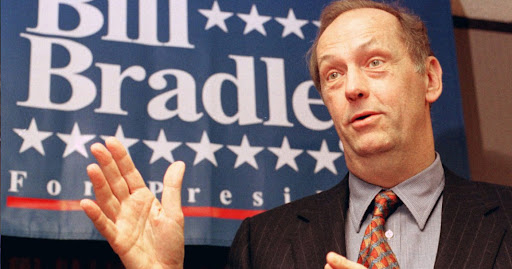BILL CLINTON became the Democrats' presidential nominee in 1992 in large measure because his party's varsity players chose to stay off the field. Certain that George Bush was unbeatable, Mario Cuomo, Sam Nunn, Dick Gephardt, and Jesse Jackson gave the race a pass. The result was that a second-string governor from a third-tier state crushed the invincible Bush in what turned out to be the most comprehensive defeat of a sitting president since William Howard Taft.
You'd think Democrats would have learned.
This time around it was Vice President Al Gore who was deemed too formidable to challenge, at least for the Democratic nomination. Senators Bob Kerrey and John Kerry gave it some thought and decided not to take a chance; so, once again, did Gephardt and Jackson. Only Bill Bradley, the ex-senator from New Jersey who barely held his seat the last time he ran for office (in 1990), opted to go after Gore.
 Could there be an upset in the making for Bill Bradley? |
Poor, earnest, dreamy Bradley, the pundits said. Nice guy, but face it: Gore's got the party sewn up.
Well, that was last month's conventional wisdom. This month the U-word is suddenly in play.
"The script for a possible upset is becoming clear," wrote David Broder, dean of the nation's political reporters, in The Washington Post on Sunday. Far from having the nomination in his pocket, "the Iowa caucuses and the New Hampshire primary look increasingly hazardous for Gore."
In the last few days, Bradley has been endorsed by three Democrats as renowned — and as different — as Paul Volcker, the sage former Federal Reserve chairman; Paul Wellstone, the paleoliberal Minnesota senator; and Ed Koch, the hyperopinionated New Yorker who served three terms as the Big Apple's irrepressible mayor. And at least one certified superstar has put his money on the challenger: Michael Jordan and his wife have written $1,000 checks to the Bradley campaign. (On the required form, Jordan listed his occupation as "retired.")
Polls that had Bradley down among the asterisks last year now suggest that he is a player to reckon with. According to Gallup, 34 percent of Democrats say they would support Bradley for the nomination today, up from 8 percent in May 1998. Gore, at 54 percent, is essentially unchanged from a year ago.
The vice president has a problem, and its initials are B.C. Two hours after the president was impeached in January, Gore declared emphatically that Bill Clinton "will be regarded in the history books as one of our greatest presidents." That isn't how most Americans feel. The electorate that twice held Clinton to less than 50 percent of the vote will be glad to see him go. In 1988, a great swath of the public would gladly have reelected Ronald Reagan to a third term; unable to do that, they did the next best thing and elevated his second-in-command.
But rare is the voter who pines for a third Clinton term. In a Pew Research poll this month, Americans overwhelmingly agreed with the statement, "I am tired of all the problems associated with the Clinton administration." The sentiment cuts across party lines: 83 percent of Republicans, 77 percent of independents, and 64 percent of Democrats share it. For Gore, those numbers are disastrous.
Other data in the Pew survey drive home the point. Respondents were asked for a one-word description of Gore. In September 1996, 32 percent had something positive to say; now, only 19 percent do. The share of those whose characterization is negative or mocking, by contrast, has climbed to 37 percent.
It is possible, of course, that Gore will surge once the primary and caucus season gets underway. There is a respectable history of front-runners stumbling early on only to pick themselves up and win the nomination — or the election — in a cakewalk.
But there is another history, just as respectable, of candidates who once soared over the field beginning to lose altitude as the nation learns more and more about them. Michael Dukakis was 17 points ahead of Bush in the spring of 1988. When voters began to focus on Dukakis's record — the "Massachusetts Miracle" that melted, the furloughs for first-degree murderers — the race turned. By November, a 17-point lead had become a 40-state rout.
Gore has been vice president for more than six years, but many Americans are only just beginning to get a fix on him. How many voters know, for instance, that Gore advocates a "strategic goal" of completely eliminating automobiles? Or that he compares people who disagree with his environmental views to those who appeased Hitler in the 1930s?
Expect to hear much more about Earth in the Balance, Gore's 1992 bestseller. Dan Quayle carries around a copy so he can read aloud passages like this one:
"The Pacific yew can be cut down and processed to produce . . . taxol, which offers some promise of curing certain forms of lung, breast, and ovarian cancer in patients who would otherwise quickly die. It seems an easy choice — sacrifice the tree for a human life — until one learns that three trees must be destroyed for each patient treated."
A would-be president who can't decide whether it is more important to save trees or human beings: Meet the real Al Gore. The GOP is betting that the more you learn about him, the less you'll want to put him in the White House. Bill Bradley is betting the same thing.
(Jeff Jacoby is a columnist for The Boston Globe).
-- ## --
Follow Jeff Jacoby on X (aka Twitter).
Discuss his columns on Facebook.
Want to read more? Sign up for "Arguable," Jeff Jacoby's free weekly email newsletter.

